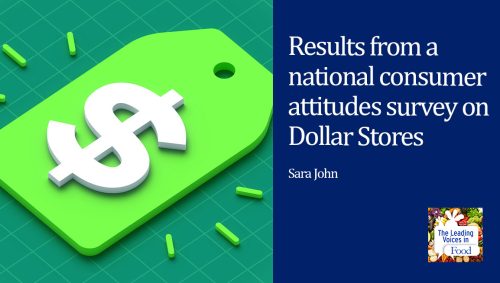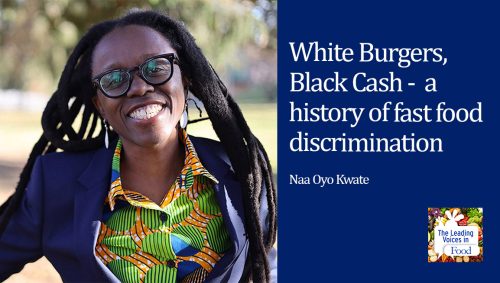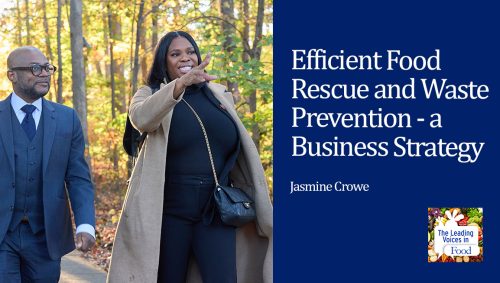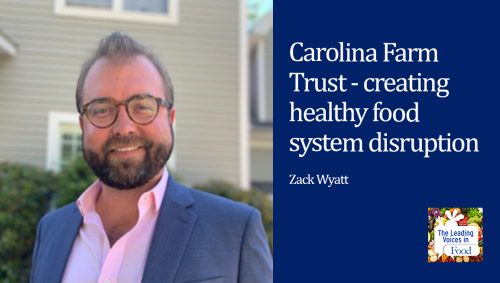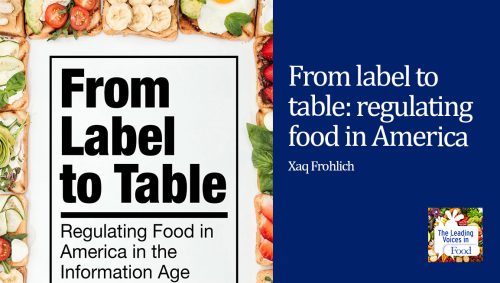E85: Changes to SNAP and WIC in Response to the Pandemic are Innovations
This podcast is part of a series focused on the impact of the COVID-19 pandemic on our food system. Today, we are talking about the changes policymakers have made to SNAP and WIC, the country’s largest federal nutrition assistance programs. Our guest is Public Policy Professor Carolyn Barnes from the Sanford School of Public Policy at Duke University.

Carolyn Barnes is an assistant professor in the Sanford School of Public Policy at Duke University. Carolyn completed a PhD in Political Science and Public Policy from the University of Michigan, where she worked as an affiliate of the National Poverty Center conducting research on the effects of nonprofit community-based service provision on parenting practices and the psychosocial wellbeing of families and children. Her research agenda broadly explores the social and political implications of social policy on low-income populations in the areas of childcare policy, family services, and supports for young children. Her most recent book project consists of an in-depth organizational ethnography that examines how publicly funded nonprofit social services shape the political behavior of the economically disadvantaged.
Interview Summary
So Carolyn, since the start of the COVID-19 pandemic, the USDA has made quite a few changes to nutrition assistance policies. Could you help our listeners understand some of those major shifts?
Well, first I would like to say they’re wonderful changes and surprisingly very generous changes in response to the COVID-19 pandemic and the economic fallout from this pandemic. We have lessened the amount of paperwork folks have to submit to apply for SNAP. We have extended eligibility periods. We also gave states the opportunity to do away with in-person interviews. A lot of states have moved to remote interviewing processes, remote intake processes. You do not have to go into the office to apply. You can apply over the phone and they’ve shifted the kinds of documents that you need to verify income levels for income eligibility, and work history and things like that. We made it easier for people by allowing them to do the interviews over the phone. We also made SNAP benefits more generous. We are maximizing the amount of benefits families can receive. We also offer the pandemic EBT for low-income children who were receiving free or reduced lunch. Families are automatically eligible without an application process if their kids who would otherwise be enrolled in school were receiving free or reduced lunch. So, maximizing the benefit amount for families and offering pandemic EBT for low income children are major expansions to the SNAP policy. Now folks have the opportunity to use their SNAP online so they can purchase food online. They can purchase food through Amazon.
With regards to WIC, we have done similar things. We have moved to remote interviewing processes. We have made it very easy for people to sign up for WIC. We have loosened food restrictions and made things much more flexible for WIC participants in the store. My research shows that using WIC benefits in retail settings can be very challenging and a barrier to people remaining on the program, but we have loosened those food restrictions and made it much easier for people to use their benefit in grocery stores. So we have just given folks tons of options that they never before. Like this is an unprecedented level of policy innovation designed to increase access to nutrition assistance programs.
That is a lot of change, but the scale of the need with the pandemic is really unprecedented in our lifetime. So is this enough to address the skyrocketing food insecurity? Is the government doing a good job?
Yes and no Sarah, I think on paper, these policies look really great. It is almost a major transformation in nutrition assistance programs. This is an unprecedented level of generosity and ease in applying for and receiving benefits.
But in practice, when we think through the implementation side, it is not necessarily a failure, I just think that there are some challenges and hurdles that are playing out on the ground. So for example, in my research, some of the interviews that we have been doing with folks that are attempting to apply for these benefits, they really do not know about these changes. So we ask, have you received your pandemic EBT? Did you know that your recertification date had been shifted? Did you know about these expanded eligibility periods? Did you know that you do not have to go into the office any longer to reapply for benefits? Are you aware that there are all these food flexibilities now and you can use your WIC to buy different things? Do you know that you can purchase food online with your SNAP benefits? And by and large, most of the folks that we talked to, and we have conducted 75 interviews since the start of this pandemic, most folks do not know that. So if the people that are being targeted by these policies, if these vulnerable families do not really know about these major changes and what they stand to benefit from these major changes are these policies really successful?
At some point we have got to take a look at the implementation process, like what’s missing? Is there a miscommunication or a breakdown in communication between the federal government and the state government? Are state agencies not communicating effectively? At least in the state of North Carolina with different counties that are tasked with implementing these new changes. And, somehow that information isn’t being shared with folks who need these programs the most, is that what’s happening? Or, are frontline workers just so overwhelmed with the growing need and demand for these programs that they aren’t able to effectively educate participants about their options, that they aren’t able to increase access. If workers can now complete a lot of these applications over the phone, but they’re inundated with calls and folks can’t actually get through to their local WIC agency or in their local department of social services, then remote interviews really aren’t benefiting people, right? They look great on paper, but in practice, I think it is a lot more complicated and we really have to think through how to effectively implement these policy changes and make some tweaks and implementation on the ground to ensure that eligible families are really having access to these programs.
It is just a tragedy that these changes are significant, but it is not reaching the families on the ground yet. Hopefully we’ll see an end of the COVID realities at some point though and we’ll return to some sense of normalcy. So, Carolyn I’m asking you to look ahead, what do you envision as the future of nutrition assistance policies? Are these changes going to be lasting? And then, how could the 2020 election affect that vision?
As it stands right now, unfortunately, a lot of these changes have an expiration date for whatever reason it inches back. So, you get an announcement from the USDA that waivers are valid till the end of September, but then you get another announcement in two or three weeks, depending on how COVID cases arising or falling and the state of stay at home orders across the United States. You get a notification saying, “We have extended it for another 30 days.” Or something like that. So, there’s an expiration date, so to speak, but it seems like that expiration date is becoming increasingly flexible. That’s a good sign. And that also gives us time to really see how people are affected by these changes and maybe a new wave of folks that might need these assistance programs. It gives us a chance to gauge how they might be experiencing these programs on the ground as well.
I think moving forward, there is a huge opportunity provided that the studies that are done now capturing the state of the world during this pandemic provided that we can demonstrate the state’s strength as opposed to its failures. I think that there is a huge opportunity to capitalize on this moment and to make these policy interventions more permanent. SNAP has always been a buffer for economic hardship for vulnerable families. Even more though, in this case, SNAP is really buoying a lot of families and offering what families would otherwise be experiencing in terms of extreme economic hardship and food insecurity. If we can demonstrate that SNAP is protective, if we can show that these remote elements of WIC access are increasing program enrollment, which is the case in the state of North Carolina, we can make the case that these things need to stay put, and they need to be around for a while. And, that there’s no need for government to shift the cost of applying for and maintaining eligibility for benefits, to citizens, to vulnerable citizens who are already on the margins and already have a host of other challenges that they’re navigating, in addition to complex bureaucracies and complex public assistance programs. Researchers and observers, and policymakers and advocates, we can make the case for keeping remote appointments for keeping food flexibilities for WIC participants, for expanding the shopping options for SNAP beneficiaries, for lengthening eligibility periods for SNAP. We can make the case for those things provided that we document their successes effectively.
Politically, SNAP has been a program that has been at risk for budget cuts. I think a year or two ago, there were lots of talks about states adding work requirements, about the federal government adding work requirements to SNAP. You can’t do that when the economy is fragile, right? You can’t do that in an economic recession when work is scarce and unemployment is high. We are going to see this pandemic expose the virtues and the pitfalls of the state, and in doing so, we can make a case for a more generous safety net that really protects citizens.








